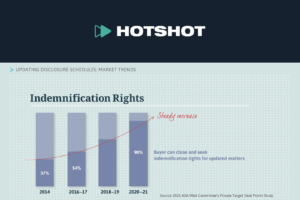This is a summary of the Hotshot course “No-Shops: Termination and Forcing the Vote,” covering termination of a deal for a superior proposal, break-up fees, and a look at what it means to “force the vote.” View the course here.
Termination
- If the target company’s board changes its recommendation, the buyer has the right to terminate the merger agreement.
- If the board determines that a competing bid actually is a Superior Proposal (not just one that could be) and changes its recommendation, then the target often has the right to terminate the agreement too.
Force the Vote
- Sometimes, instead of letting the target terminate the deal to take a Superior Proposal, the buyer may negotiate for a “force the vote” provision.
- This requires that the target board put the original transaction in front of its shareholders, so they can decide whether to take it despite the board’s changed recommendation.
- The principal impact is that it grants a timing and tactical advantage over the competing bid.
- This requires that the target board put the original transaction in front of its shareholders, so they can decide whether to take it despite the board’s changed recommendation.
Break-up Fees
- If either the target or the buyer does terminate the deal, then the target must pay the buyer a break-up fee.
- Fees aren’t very high, usually ranging around 2% to 4% of the deal value.
- That’s because of case law developed over the years to ensure that fees don’t preclude competing bids.
- Fees aren’t very high, usually ranging around 2% to 4% of the deal value.
This course also includes interview footage with Jenny Hochenberg from Freshfields Bruckhaus Deringer and Igor Kirman from Wachtell, Lipton, Rosen & Katz.

















